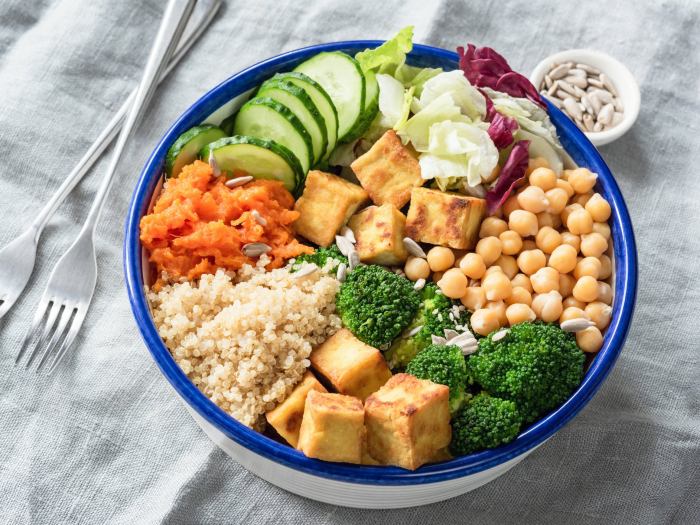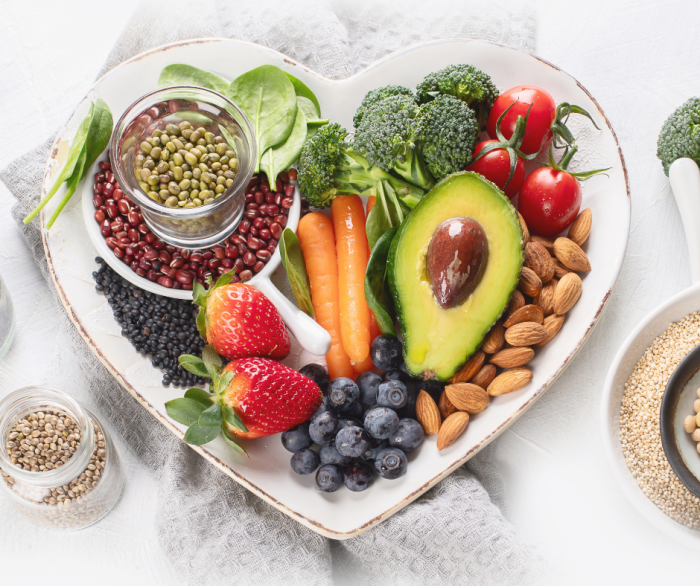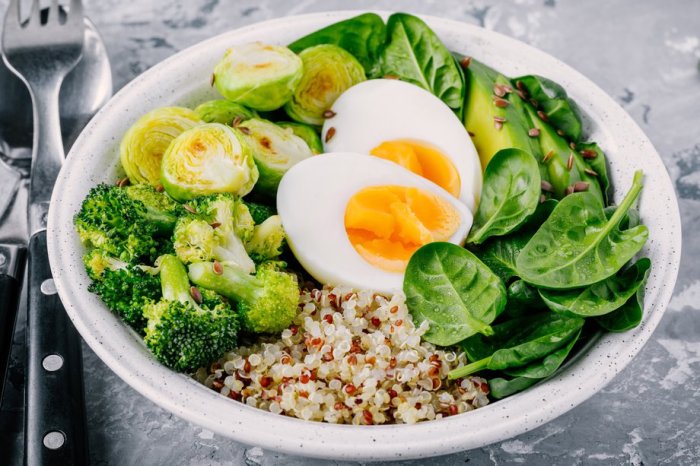How to eat a balanced vegetarian diet – Embarking on a balanced vegetarian diet can transform your well-being. Discover the essential nutrients, food groups, meal planning strategies, and healthy cooking techniques to thrive on a plant-based journey.
Delving into the nuances of vegetarian nutrition, this guide provides practical tips, delicious recipes, and expert insights to empower you in making informed dietary choices.
Introduction
A balanced vegetarian diet is essential for maintaining optimal health and well-being. Vegetarian diets exclude meat, poultry, fish, and seafood, and instead focus on plant-based foods such as fruits, vegetables, whole grains, legumes, nuts, and seeds.Adopting a vegetarian diet offers numerous health benefits.
Research suggests that vegetarians tend to have lower rates of chronic diseases such as heart disease, stroke, type 2 diabetes, and some types of cancer. Vegetarian diets are typically high in fiber, antioxidants, and phytochemicals, which contribute to overall health and longevity.Transitioning to a vegetarian diet can be a gradual process.
Start by incorporating more plant-based meals into your weekly routine. Gradually reduce your intake of meat and animal products, and explore new vegetarian recipes. Consider consulting with a registered dietitian or healthcare professional for personalized guidance.
Embark on a culinary adventure that nourishes both your body and soul with a vegetarian healthy eating plan. This mindful approach to food empowers you with a vibrant array of nutrient-rich fruits, vegetables, whole grains, and legumes. By embracing the plant-based kingdom, you unlock a symphony of flavors and textures while supporting your overall well-being.
Essential Nutrients for Vegetarians

A balanced vegetarian diet provides all the essential nutrients that the body needs. These nutrients include protein, carbohydrates, fats, vitamins, and minerals. Vegetarians can obtain these nutrients from a variety of plant-based sources, including fruits, vegetables, legumes, nuts, and seeds.
Here is a table of vegetarian sources of essential nutrients:
| Nutrient | Vegetarian Sources |
|---|---|
| Protein | Beans, lentils, tofu, tempeh, nuts, seeds |
| Carbohydrates | Fruits, vegetables, whole grains |
| Fats | Nuts, seeds, avocados, olive oil |
| Vitamins | Fruits, vegetables, fortified cereals |
| Minerals | Beans, lentils, nuts, seeds, leafy green vegetables |
Food Groups for a Balanced Diet
A balanced vegetarian diet includes a variety of foods from all food groups to ensure adequate intake of essential nutrients. These food groups provide the body with the energy, vitamins, minerals, and other nutrients it needs to function properly.
The following are the main food groups for vegetarians:
Fruits
- Fruits are a good source of vitamins, minerals, and fiber. They can be eaten fresh, frozen, canned, or dried.
- Examples of fruits include apples, bananas, berries, citrus fruits, and melons.
Vegetables, How to eat a balanced vegetarian diet
- Vegetables are a good source of vitamins, minerals, and fiber. They can be eaten raw, cooked, or juiced.
- Examples of vegetables include broccoli, carrots, celery, leafy greens, and tomatoes.
Whole Grains
- Whole grains are a good source of fiber, vitamins, and minerals. They can be eaten cooked or uncooked.
- Examples of whole grains include brown rice, oatmeal, quinoa, and whole-wheat bread.
Legumes
- Legumes are a good source of protein, fiber, and iron. They can be eaten cooked or sprouted.
- Examples of legumes include beans, lentils, peas, and soybeans.
Nuts and Seeds
- Nuts and seeds are a good source of protein, healthy fats, and fiber. They can be eaten raw, roasted, or ground into a butter.
- Examples of nuts and seeds include almonds, cashews, chia seeds, and walnuts.
Dairy Products (Optional)
- Dairy products are a good source of calcium, protein, and vitamin D. However, they are not necessary for a healthy vegetarian diet.
- Examples of dairy products include milk, yogurt, and cheese.
Meal Planning for Vegetarians

Meal planning is crucial for vegetarians to ensure they meet their nutritional needs. By incorporating a variety of plant-based foods, vegetarians can create balanced and satisfying meals.
Tips for Planning Balanced Vegetarian Meals
- Include a variety of plant-based foods:Aim to include fruits, vegetables, whole grains, legumes, nuts, and seeds in every meal.
- Choose nutrient-rich foods:Focus on consuming foods that are high in protein, fiber, vitamins, and minerals.
- Plan ahead:Meal planning helps prevent last-minute unhealthy choices and ensures you have the necessary ingredients on hand.
- Cook meals at home:Cooking meals at home gives you more control over the ingredients and portion sizes.
- Read food labels:Pay attention to food labels to identify hidden sources of animal-derived ingredients.
Sample Meal Plan for Vegetarians
Here’s a sample meal plan that provides a balanced intake of nutrients for vegetarians:
- Breakfast:Oatmeal with berries, nuts, and soy milk
- Lunch:Salad with grilled tofu, quinoa, and vegetables
- Dinner:Lentil soup with whole-wheat bread
- Snacks:Fruits, vegetables, nuts, or yogurt
Table of Vegetarian Meal Ideas
| Meal | Vegetarian Options |
|---|---|
| Breakfast | Oatmeal with fruit and nuts, tofu scramble, whole-wheat toast with avocado |
| Lunch | Salads with grilled tofu or tempeh, lentil soup, veggie burgers on whole-wheat buns |
| Dinner | Stir-fries with vegetables and tofu, pasta with marinara sauce and vegetables, lentil tacos |
| Snacks | Fruits, vegetables, nuts, seeds, yogurt, hummus |
Healthy Cooking for Vegetarians: How To Eat A Balanced Vegetarian Diet
Cooking vegetarian dishes can be a healthy and delicious way to get all the nutrients your body needs. By following a few simple tips, you can create tasty and nutritious vegetarian meals that will help you stay healthy and energized.
Tips for Cooking Vegetarian Dishes
- Use a variety of vegetables and legumes. This will help you get a wide range of nutrients, including protein, fiber, vitamins, and minerals.
- Cook your vegetables in a healthy way. Steaming, roasting, or grilling are all good options that will preserve the nutrients in your vegetables.
- Use herbs and spices to flavor your dishes. This will help you reduce your sodium intake and add flavor to your meals.
- Don’t be afraid to experiment. There are many different ways to cook vegetarian dishes, so don’t be afraid to try new recipes and find what you like best.
Recipes for Vegetarian Dishes
Here are a few recipes for vegetarian dishes that are both healthy and delicious:
- Vegetable stir-fry
- Lentil soup
- Black bean tacos
- Quinoa salad
- Vegetable curry
Common Challenges for Vegetarians
Adopting a vegetarian diet offers numerous health benefits, but it also presents certain challenges that require careful planning and attention.
Embark on a journey towards optimal well-being with a vegetarian healthy eating plan. This approach not only nourishes your body but also aligns with a compassionate lifestyle, promoting the welfare of animals and the planet.
One of the primary challenges is ensuring adequate intake of essential nutrients, such as protein, iron, calcium, and vitamin B12, which are commonly found in animal products.
Meeting Nutritional Needs
- Protein:Vegetarian sources of protein include beans, lentils, tofu, tempeh, nuts, and seeds.
- Iron:Good sources of iron for vegetarians are leafy green vegetables, fortified cereals, and beans.
- Calcium:Calcium can be obtained from fortified plant milks, leafy green vegetables, and tofu.
- Vitamin B12:Vitamin B12 is primarily found in animal products, so vegetarians need to supplement their diet with fortified foods or supplements.
Social and Cultural Considerations
- Dining Out:Finding vegetarian options at restaurants can be challenging, especially when traveling or in unfamiliar areas.
- Social Events:Vegetarian diets may not always be well-understood or accommodated at social gatherings, leading to potential awkwardness or dietary restrictions.
Tips for Overcoming Challenges
- Meal Planning:Plan meals in advance to ensure a balanced intake of nutrients.
- Variety:Consume a wide variety of plant-based foods to meet nutritional needs.
- Fortified Foods:Choose fortified plant milks, cereals, and other products to supplement nutrient intake.
- Supplements:Consider taking vitamin B12 supplements to ensure adequate intake.
- Communication:When dining out or attending social events, inform hosts or restaurant staff about dietary preferences to avoid any issues.
Resources for Vegetarians
Vegetarians can benefit from a variety of resources to support their dietary choices and overall health. These resources provide information, guidance, and support to help vegetarians maintain a balanced and nutritious diet.
Some of the most valuable resources for vegetarians include:
Cookbooks
Cookbooks specifically designed for vegetarians offer a wide range of recipes and meal ideas to help vegetarians create delicious and nutritious meals. These cookbooks often provide tips and techniques for vegetarian cooking, as well as information on vegetarian nutrition.
Websites
Numerous websites provide information and support for vegetarians. These websites offer recipes, meal plans, nutrition information, and forums where vegetarians can connect with others and share experiences.
Support Groups
Support groups provide a valuable opportunity for vegetarians to connect with others who share their dietary choices. These groups offer support, encouragement, and a sense of community.
Last Point

Adopting a balanced vegetarian diet not only nourishes your body but also aligns with ethical and environmental values. By embracing the principles Artikeld in this guide, you can unlock a world of culinary delights while promoting your health and the planet’s well-being.
Popular Questions
Can vegetarians get enough protein?
Yes, vegetarians can obtain sufficient protein from plant-based sources such as beans, lentils, tofu, tempeh, nuts, and seeds.
Is it difficult to transition to a vegetarian diet?
Transitioning to a vegetarian diet can be gradual and tailored to your preferences. Start by incorporating more plant-based meals into your routine and gradually reduce meat consumption.
Are there any specific health concerns for vegetarians?
Vegetarians should pay attention to their intake of vitamin B12, iron, and calcium. These nutrients can be obtained from fortified foods, supplements, or regular blood tests to monitor levels.